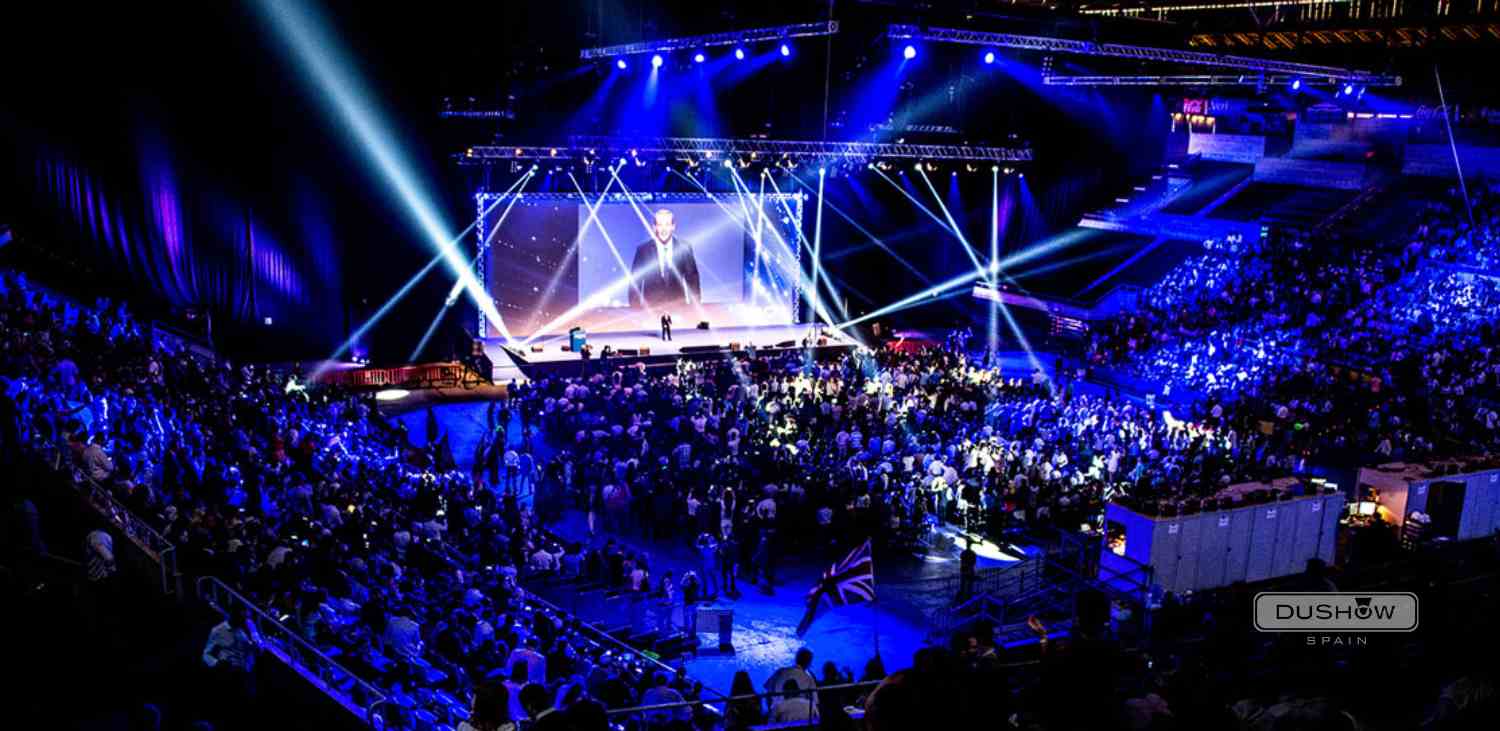Dushow Spain is now Novelty Spain
Event management: Who takes part in the technical production of an event?
Producing an event is a challenge in every sense of the word. Your challenge. This is even truer when it comes to the technical side. Event management is an exciting, but also stressful process, packed with details that involve many steps, each of which takes place in a well-planned sequence.
The creation of your new event requires a team of qualified professional technicians focused on your needs. Want to know who takes part in the technical side of event management? Then keep reading!
Your “AV partner”
Choosing the audiovisual company that will organize your event is a key decision. This company is going to be responsible for every phase of the design, production and management of your event, technically speaking.
It’s essential that you know the key personnel of the audiovisual company organizing your event. That’s why in the following paragraphs, we’ll discuss the main roles responsible for supervising the specialized crews who will carry out each technical part of your event.
They will also closely monitor and manage the process—and quality—of your event in every stage of execution, and overall.
1. Sales consultant
The event management process usually begins with you, the event customer, working with the highly-qualified sales team of your AV partner. The sales team should adapt to all of your needs, and clarify any questions you may have.
Your sales consultant will be an expert on the key details of event management from a technical standpoint. This person will have detailed knowledge on the solutions they can offer you.
Your sales consultant will have the answers to your questions on the audiovisual company, a library of example plots and renderings, available resources in lighting, sound, video, rigging, decoration, simultaneous translation, content, etc.
The sales consultant can also guide you on the electrical demands of your event, what the standard characteristics are, the options and improvements they can offer and much more.
Your sales consultant will work with you through the selection process for your event. Some audiovisual companies have showrooms that you can visit to see the equipment for yourself, or even try it out.
In addition to the showrooms, many audiovisual companies invest in simulations, computerized animation and even 3D or interactive graphics that help you envision the final look of your event.
Once the proposal has been confirmed, a specialized Project Manager will guide you through the event management process from beginning to end, handling the project management with the support of their team.
2. AV Project Manager
The AV Project Manager will be the person responsible for coordinating everything. They will guarantee the design, planning, performance and quality of the work, ensuring that all parties involved meet the terms of the approved plan.
The key members of this team will work closely among themselves and with you to comply with every step in the event management process and help you meet your goals. In short, to help you communicate your message.
The creation of your new event requires a team of qualified professionals focused on your needs. A specialized Project Manager will be present throughout all the processes; from the beginning, for the duration and until the end of the event. Everything will be covered by the management of the audiovisual company.
Now let’s take a look at who does what in the event production process:
3. The designer
Once you’ve agreed with the Project Manager on the details of your event, designers go to work with the AV Project Manager. They may be employees of the audiovisual company or freelance professionals.
In any event, the designer will sketch out the technical materials on the plans to visualize the project’s implementation and viability.
Most venues where events are organized have AutoCAD drawings. The designer will make sure that the space depicted in the drawing sent has not undergone any changes. For example, if there have been remodelling works and the drawing has not been updated, and this may have an impact on the implementation of the materials or some other part of the installation.
The result: a set of nice-looking plans (also known as floor plans or renders).
4. The technical producer
Once you’ve approved the project (plans, materials and budget) the technical producer begins to take action. They will meet with the Project Manager, who will give them an overview of your event’s management.
The technical producer will be responsible for the calculations related with your event (weights, electroacoustic calculations, electrical consumption, photometrical calculations, static and dynamic load calculations, among others).
Once the needs have been clearly defined, they will provide the warehouse staff with a delivery note detailing all the necessary equipment, for them to carefully, thoroughly prepare and load it onto the respective transport vehicles. The equipment is then taken to the venue where your event is to be held.
5. Crew chief
Though the names of the posts may vary from one audiovisual company to another, the one you choose to conduct and manage your event will designate a key member of their staff as Crew Chief for the event.
Regardless of the exact name they are given, your Crew Chief is a highly qualified project director with experience in every stage of event production. They will normally have extensive experience in every part of event management (lighting, sound, video, rigging, decoration, etc.).
The event supervisor will personally carry out a number of basic tasks that are essential for event management. Furthermore, they will coordinate the work with other team members. Usually, this supervisor will:
- Work closely with the employees and suppliers of the audiovisual company.
- Plan the work of specialized technicians in sequential order as the installation progresses through set-up, the event itself and for take-down.
- Ensure that the technicians of every discipline complete their tasks on time, and deliver high-quality work to the next team in the process. Handling these deliveries is a fundamental part of the event production process.
- Making inspections, guaranteeing quality control and ensuring that everyone works according to plan.
As this figure is responsible for the overall management of the event, in addition to handling and overseeing the entire process to deliver a high-quality project according to plans, they could be thought of as the conductor of an orchestra who harmonizes all the different parts being played: the right people, materials, processes and inspections in an order carefully planned for the successful production of your event.
The Crew Chief will be your main contact person at the event. The audiovisual company should offer you some pre-arranged times to visit the event space during key moments of the set-up, such as a walk-through of the truss assembly (if there is one) prior to the elevation of the truss bridge, when the equipment has been fastened to it.
6. Main specialized technicians
Every event features a number of disciplines and components that are assembled by experienced technicians. Though the following list is not exhaustive, it includes the specialized technicians that perform duties relevant to setting up an event.
Specialized technicians generally perform the following event management tasks:
- Lighting: They prepare, assemble and operate the stage lighting systems and electrical effects. Management of lighting systems is usually done from a lighting desk.
- Sound: They’re responsible for the optimal pick-up, recording and/or reproduction of sound at events.
- Video: They’re in charge of monitoring video recording and equipment, acoustics and image processing.
Rigging: These technicians handle all overhead systems, for example the installation of speakers, lights, projectors and all the additional equipment necessary for their proper, safe fastening: from the truss, to the motors, supports, lifting towers, etc.
7. Inspectors
Over the course of the set-up, at least two sets of inspections key to event management will be conducted. One is performed immediately before the truss is hoisted, and the second before the event begins.
In short, every professional involved in the management and production of your event, from the AV Project Manager to the Crew Chief, including the designer, sales consultants and all the different technicians and inspectors, share a common goal: delivering an original, high-quality event that complies with all regulations, but above all, meets your goals.
What’s the outcome? You’ll enjoy a personalized event, managed according to your own style and taste. Most importantly, you’ll be able to dedicate your time and energy to what really matters, and not have to do it all on your own.
We hope this article has helped you better understand the professional roles at work in the technical production of your event. If you need any further assistance in the selection of an audiovisual company, we recommend this video, which will give you more detail on how to do it:
If you like what you’ve seen, make sure to subscribe to our channel and visit our blog to never miss out on any essential content on the technical production and organization of face-to-face, hybrid and virtual events.
This article was first published in Dushow Spain, you can read the original Spanish version here.





